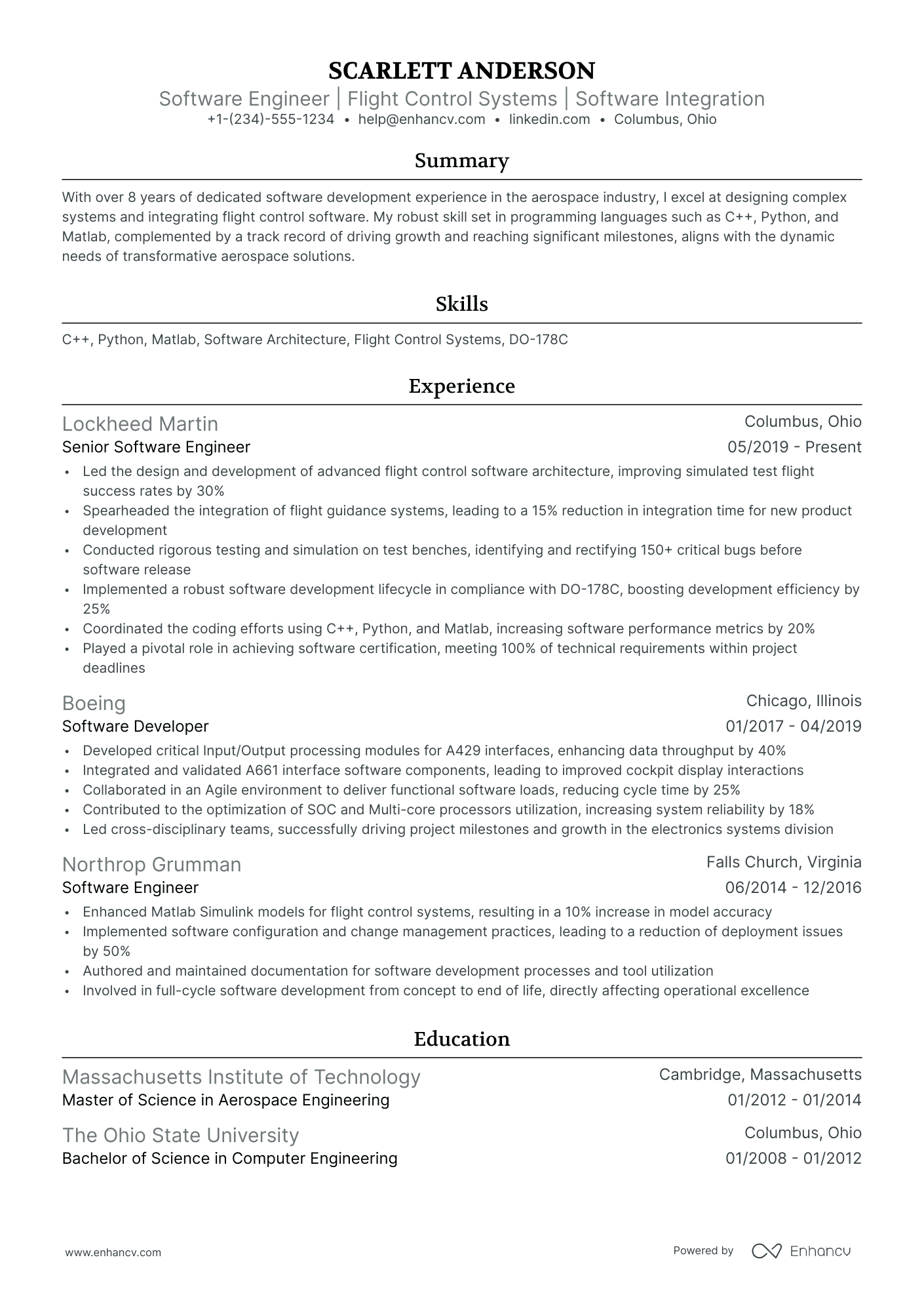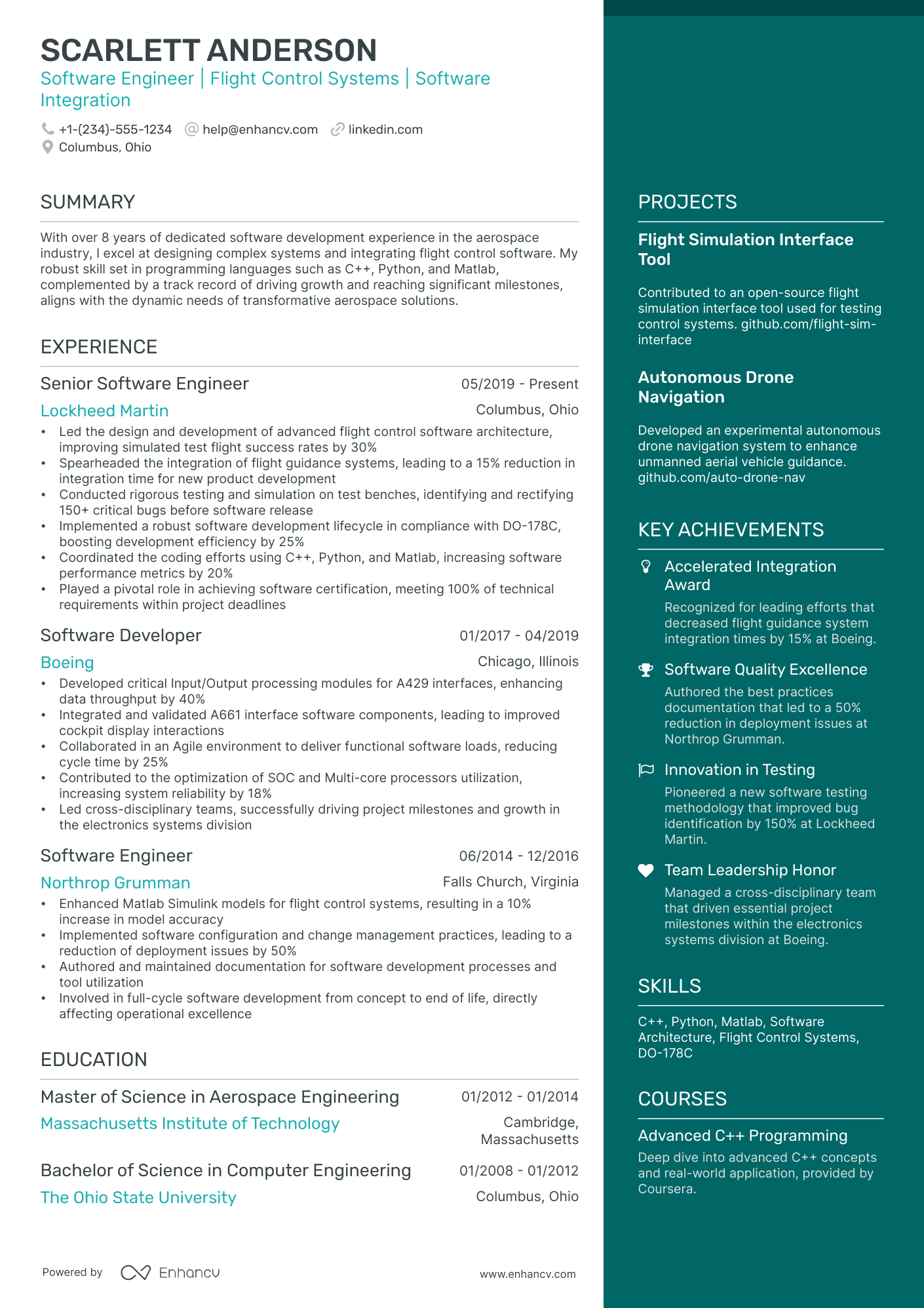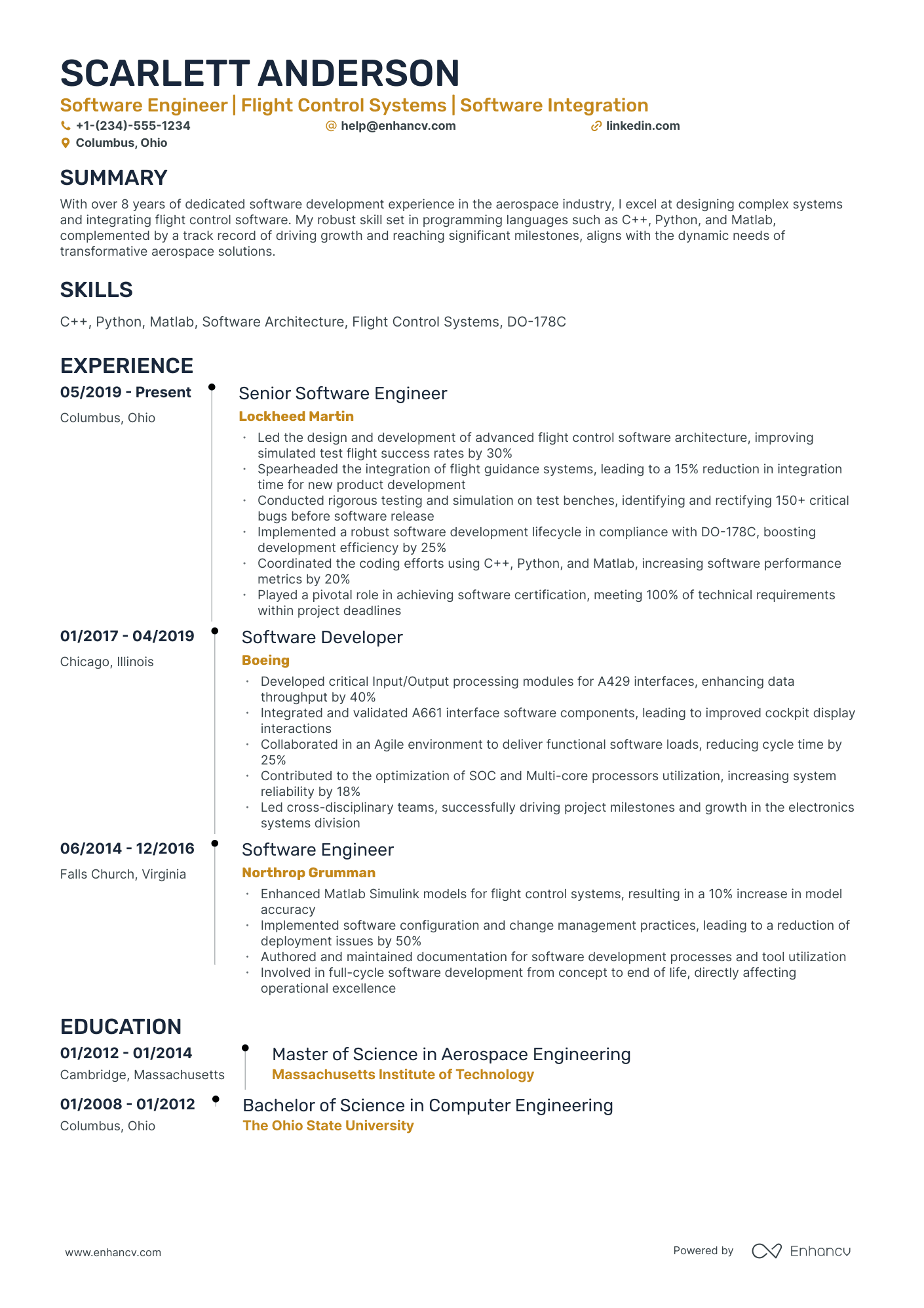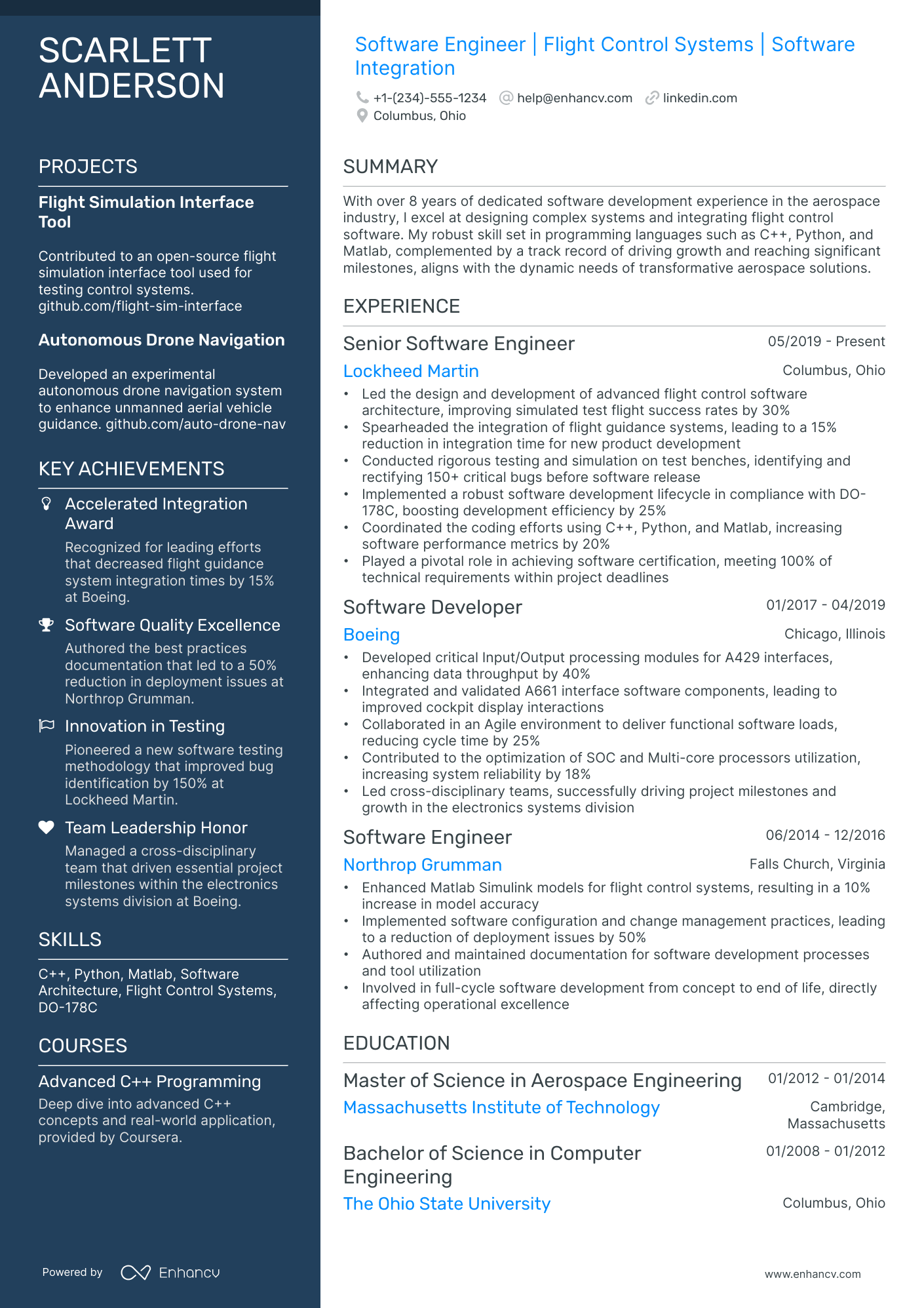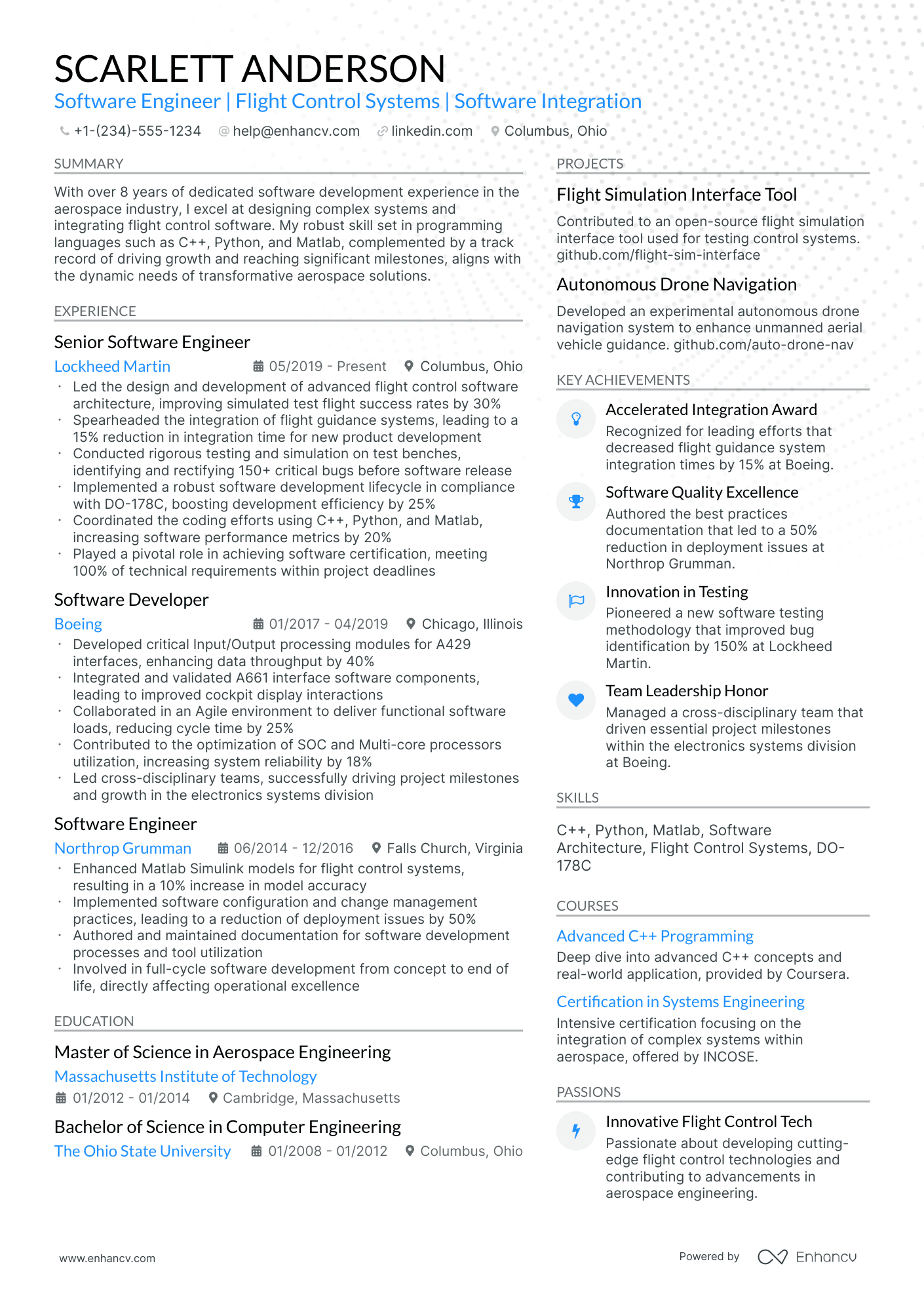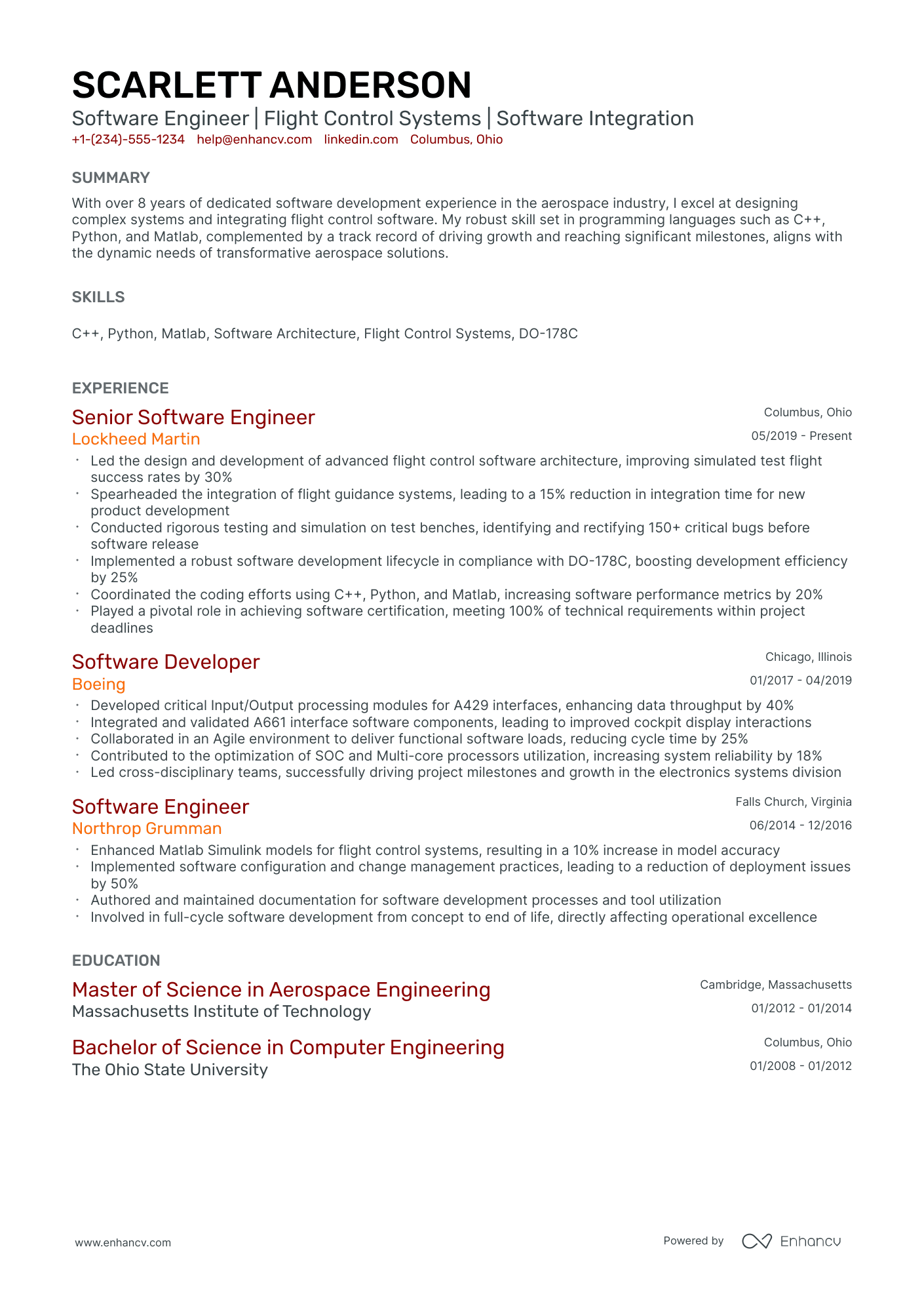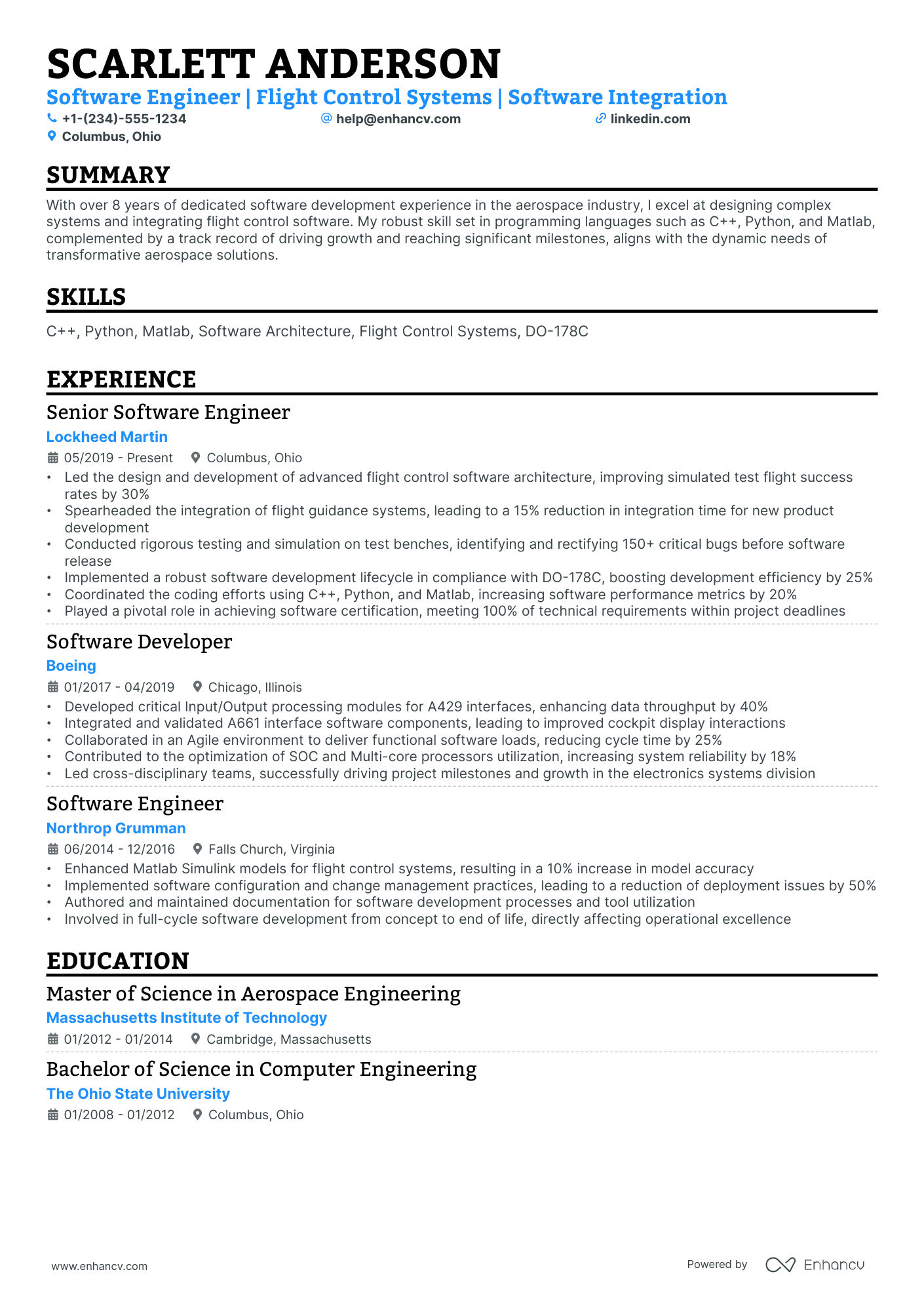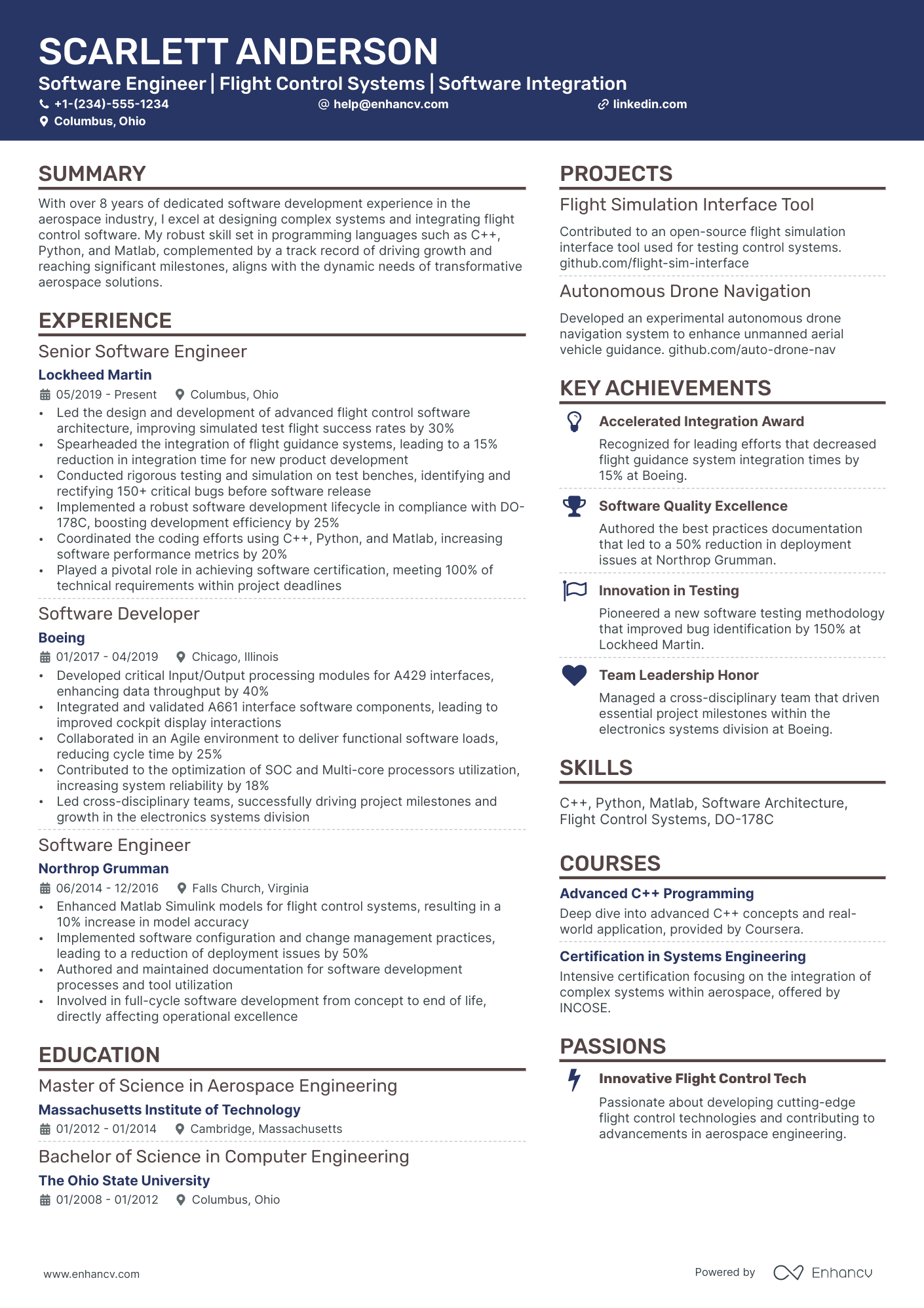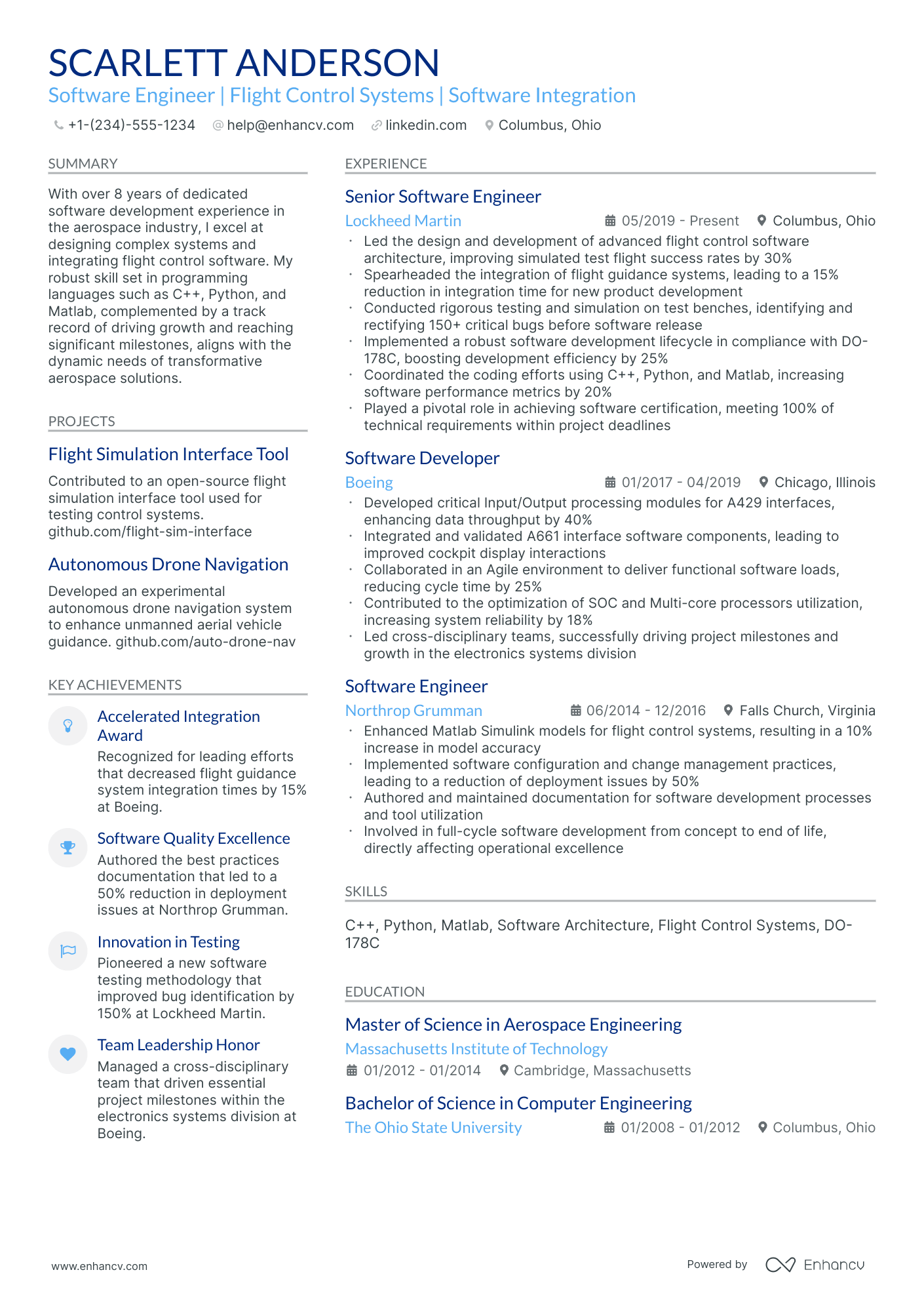As an embedded software engineer, articulating the complexities of your projects and demonstrating how your deep technical skills translate to potential business value can be a significant resume challenge. Our guide offers tailored strategies to help you effectively communicate your expertise, ensuring hiring managers grasp the full scope and impact of your embedded system contributions.
- Embedded software engineer resumes that are tailored to the role are more likely to catch recruiters' attention.
- Most sought-out embedded software engineer skills that should make your resume.
- Styling the layout of your professional resume: take a page from embedded software engineer resume examples.
How to write about your embedded software engineer achievements in various resume sections (e.g. summary, experience, and education).
- EDI Developer Resume Example
- Software Specialist Resume Example
- Staff Software Engineer Resume Example
- J2EE Developer Resume Example
- Senior Oracle Developer Resume Example
- Integration Developer Resume Example
- Android Developer Resume Example
- Mobile Application Developer Resume Example
- Senior PHP Developer Resume Example
- Software Programmer Resume Example
Don't stress out over your embedded software engineer resume format
Remember, the elaborate design of your embedded software engineer resume isn't what impresses recruiters most. They are primarily searching for candidates who meet the job requirements. The main aim of your resume should be to clearly and concisely explain why employers should hire you.
Here are four straightforward steps to consider in your embedded software engineer resume design:
- Organize your resume based on experience: Start with your most recent roles. Besides using reverse chronological order, choose jobs relevant to the position you're applying for.
- Include your contact details (and portfolio or LinkedIn link) in your resume's header to ensure recruiters can easily reach you. If considering adding a professional photo, check acceptable practices in different countries first.
- Don't omit essential embedded software engineer resume sections such as the summary or objective, experience, and education. These sections should reflect your career progression and align with job requirements.
- Maintain conciseness in your resume. For those with less than ten years of experience, a one-page format is advisable.
Regarding the format to submit your embedded software engineer resume, PDF is preferable. PDFs are more likely to maintain their formatting when processed through recruitment software or ATS, saving you time in the application process.
When selecting a font for your embedded software engineer resume, consider the following:
- Choose ATS-friendly fonts such as Exo 2, Volkhov, Lato, etc., to keep your resume's content legible;
- All serif and sans-serif fonts are easily readable by ATS;
- While Arial and Times New Roman are common choices, opting for unique typography can help your resume stand out.
Concerned about ATS compatibility with charts and infographics? Our recent study has debunked this and other myths.
Tailor your resume format to the job market – a Canadian resume, for example, might differ in layout.
Upload & Check Your Resume
Drop your resume here or choose a file. PDF & DOCX only. Max 2MB file size.
PRO TIP
Always remember that your embedded software engineer certifications can be quantified across different resume sections, like your experience, summary, or objective. For example, you could include concise details within the expertise bullets of how the specific certificate has improved your on-the-job performance.
Essential sections that should make up your embedded software engineer resume include:
- The header - with your contact details (e.g. email and telephone number), link to your portfolio, and headline
- The summary (or objective) - to spotlight the peaks of your professional career, so far
- The experience section - with up to six bullets per role to detail specific outcomes
- The skills list - to provide a healthy mix between your personal and professional talents
- The education and certification - showing your most relevant degrees and certificates to the embedded software engineer role
What recruiters want to see on your resume:
- Proficiency in programming languages such as C, C++, and Assembly specific to hardware interfacing and embedded system programming.
- Experience with real-time operating systems (RTOS) and understanding of microcontroller/microprocessor architectures.
- Demonstrated ability in hardware debugging and using tools like oscilloscopes, logic analyzers, and JTAG debuggers.
- Familiarity with communication protocols such as SPI, I2C, UART, CAN, and Ethernet used in embedded systems.
- Knowledge of version control systems such as Git and experience with embedded software development life cycle, documentation, and testing methodologies.
What is the resume experience section and how to write one for your past roles
The experience section in a embedded software engineer resume is critical for your profile and overall application. It should not only display your work history, but also highlight your achievements in previous roles.
Many candidates either simply list their duties or provide excessive details about past, irrelevant jobs. A more effective approach involves first examining the job advertisement for keywords - specifically, skills essential for the role. Then, demonstrate these key requirements throughout different parts of your resume, using accomplishments from your roles.
Format each bullet point in your experience section by starting with a strong action verb. Follow this with a description of your role and its impact on the team or organization.
Aim to include three to five bullet points for each role.
Finally, gain insights into how professionals have crafted their embedded software engineer resume experience sections by exploring some best practice examples.
- Engineered and integrated embedded systems for real-time data acquisition and control for automotive applications, enhancing vehicle efficiency by 20%.
- Led a team of 5 in the development of firmware for IoT devices, achieving a 30% reduction in power consumption through optimized code.
- Collaborated closely with hardware teams to design and implement robust software architecture for use in extreme environmental conditions, resulting in a 99% reliability rate for deployed military communication devices.
- Developed custom Linux-based operating systems for embedded platforms which led to a 25% improvement in system boot times.
- Authored technical documentation and provided training for 40+ staff on best practices in embedded software development.
- Implemented Continuous Integration/Continuous Deployment (CI/CD) pipelines that reduced time to market by 15% for new software releases.
- Executed complete firmware development lifecycle for commercial smart home devices, contributing to a 35% increase in product sales.
- Instituted rigorous code review and automated testing procedures that decreased critical bug occurrence by 40%.
- Spearheaded the migration from a monolithic codebase to a modular approach, greatly enhancing maintainability and scalability.
- Engineered embedded software for medical diagnostic devices adhering to strict FDA standards ensuring compliance and patient safety.
- Devised an algorithm for predictive maintenance in industrial machinery, which cut down on unexpected downtime by 25%.
- Optimized cross-compilation and toolchain setup for embedded applications, which accelerated development cycles by 20%.
- Developed SCP/SSL communication protocols for secure embedded applications that improved data security by 50%.
- Performed root-cause analysis on embedded system crashes, reducing system failures by 60% within the first year.
- Guided the transition to an Agile development environment, which increased team productivity by 30% and improved interdepartmental communications.
- Led a cross-functional team in the development of aerospace embedded systems, achieving a 99.9% success rate in mission-critical software deployments.
- Incorporated machine learning algorithms into embedded systems for predictive analytics, elevating product intelligence and customer value.
- Established benchmarking standards for software performance, which served as the guideline for subsequent development projects and improved system throughput by 20%.
- Coordinated international teams in the development of cutting-edge automotive infotainment systems, which captured a 15% larger market share.
- Pioneered the use of advanced static analysis tools in the embedded software development cycle, which mitigated potential security vulnerabilities by 70%.
- Contributed to the open source community by developing custom Linux drivers which were adopted by major hardware manufacturers for next-gen devices.
- Customized real-time operating systems for data-intensive satellite communication systems, achieving a 50% improvement in signal processing time.
- Conducted in-depth performance tuning of system-level software, which led to a 25% increase in the overall efficiency of embedded solutions.
- Directed the upgrade of firmware for robotics systems, which enhanced motion control precision and reduced energy consumption by 10%.
The following content includes information from "O*NET OnLine" by the U.S. Department of Labor, Employment and Training Administration (USDOL/ETA). Used under the CC BY 4.0 license. The data represents the top responsibilities present on the task lists for embedded software engineer professionals.
Top Responsibilities for Embedded Software Engineer:
- Analyze information to determine, recommend, and plan installation of a new system or modification of an existing system.
- Analyze user needs and software requirements to determine feasibility of design within time and cost constraints.
- Confer with data processing or project managers to obtain information on limitations or capabilities for data processing projects.
- Confer with systems analysts, engineers, programmers and others to design systems and to obtain information on project limitations and capabilities, performance requirements and interfaces.
- Consult with customers or other departments on project status, proposals, or technical issues, such as software system design or maintenance.
- Coordinate installation of software system.
- Design, develop and modify software systems, using scientific analysis and mathematical models to predict and measure outcomes and consequences of design.
- Determine system performance standards.
- Develop or direct software system testing or validation procedures, programming, or documentation.
- Modify existing software to correct errors, adapt it to new hardware, or upgrade interfaces and improve performance.
Quantifying impact on your resume
- Highlight the optimization of code that resulted in a measurable performance increase, such as reducing execution time by a certain percentage.
- Document the reduction in memory usage achieved through efficient programming, noting the percentage decrease in resources required.
- Detail the number of embedded systems projects completed within strict deadlines, demonstrating project management and efficiency.
- Specify the size of the codebase maintained or developed, giving a clear indication of your experience with large-scale software.
- Report on the successful integration of embedded software with hardware, citing the number of devices your software is running on.
- Mention any contributions to power saving, including quantifiable battery life extensions or energy efficiency improvements.
- Outline the number of firmware updates or patches released that have improved system stability or added features.
- Include the scale of automated testing frameworks established, for example, covering X number of functions or features.
Action verbs for your embedded software engineer resume
Writing your embedded software engineer experience section without any real-world experience
Professionals, lacking experience, here's how to kick-start your embedded software engineer career:
- Substitute experience with relevant knowledge and skills, vital for the embedded software engineer role
- Highlight any relevant certifications and education - to showcase that you have the relevant technical training for the job
- Definitely include a professional portfolio of your work so far that could include university projects or ones you've done in your free time
- Have a big focus on your transferable skills to answer what further value you'd bring about as a candidate for the embedded software engineer job
- Include an objective to highlight how you see your professional growth, as part of the company
Recommended reads:
PRO TIP
If you failed to obtain one of the certificates, as listed in the requirements, but decide to include it on your resume, make sure to include a note somewhere that you have the "relevant training, but are planning to re-take the exams". Support this statement with the actual date you're planning to be re-examined. Always be honest on your resume.
The right balance between hard skills and soft skills for your embedded software engineer resume
Wondering what the perfect embedded software engineer resume looks like? The candidate's profile meets job requirements by balancing both hard skills and soft skills across their resume.
- Hard skills are all the technologies you're apt at using . Prove you have the right technical background by listing key industry hardware/software in your embedded software engineer resume skills section and noteworthy certifications.
- Soft skills are both your personal, mindset, communication, analytical, and problem-solving talents . Use your embedded software engineer resume achievements section to show how you've used a particular soft skill to reach a tangible outcome.
When writing about your unique skill set, always make sure to refer back to the job advert to see what are the key requirements. This ensures you've tailored your resume so that it matches closer to what the ideal candidate profile is.
Top skills for your embedded software engineer resume:
C/C++ programming
Embedded systems design
RTOS (Real-Time Operating Systems)
Microcontrollers and Microprocessors
Debugging and troubleshooting
Embedded Linux
Hardware-software integration
Communication protocols (I2C, SPI, UART)
Version control systems (Git)
Embedded software development tools (e.g., IDEs, debuggers)
Problem-solving
Attention to detail
Team collaboration
Effective communication
Time management
Adaptability
Critical thinking
Creativity
Analytical skills
Project management
Next, you will find information on the top technologies for embedded software engineer professonals from "O*NET OnLine" by the U.S. Department of Labor, Employment and Training Administration (USDOL/ETA). Used under the CC BY 4.0 license.
Top technologies for Embedded Software Engineer’s resume:
- Oracle Java 2 Platform Enterprise Edition J2EE
- Oracle SQL Developer
- Blackboard software
- GraphQL
- Apache Spark
- TypeScript
PRO TIP
If you failed to obtain one of the certificates, as listed in the requirements, but decide to include it on your resume, make sure to include a note somewhere that you have the "relevant training, but are planning to re-take the exams". Support this statement with the actual date you're planning to be re-examined. Always be honest on your resume.
Including your education and certification on your embedded software engineer resume
The significance of your resume education section is paramount. It can show your diverse talents and experiences that are relevnt to the position.
- Incorporate educational qualifications, mentioning the institution and period.
- If you're on your academic journey, pinpoint your expected completion date.
- Opt for leaving out degrees that don't serve the job's purpose.
- Provide an overview of your educational experiences if it spotlights your milestones.
When recruiting for embedded software engineer roles, candidates with relevant education and certification definitely stand out amongst competitors.
Showcase your academic background in the best way possible by:
- Listing all degrees and certifications that are part of the candidate qualifications in the embedded software engineer advert
- Including any extra certificates, if they make sense to your application
- Not going over the top in details - the certificate name, institution, and dates are enough
- If you're in the process of obtaining a degree or certificate that's relevant to the job, include your expected graduation/certification dates
The education and certification sections help back up your application with years of experience in the industry or niche.
Select some of the most cutting-edge or applicable credentials for your next embedded software engineer application from our list:
The top 5 certifications for your embedded software engineer resume:
- Certified Software Development Professional (CSDP) - IEEE Computer Society
- Certified Systems Engineering Professional (CSEP) - International Council on Systems Engineering (INCOSE)
- Certified Reliability Engineer (CRE) - American Society for Quality (ASQ)
- Certified Secure Software Lifecycle Professional (CSSLP) - (ISC)²
- Embedded Systems Certificate - University of California, Irvine Division of Continuing Education (UCI DCE)
The content below includes information from "O*NET OnLine" by the U.S. Department of Labor, Employment and Training Administration (USDOL/ETA). Used under the CC BY 4.0 license. The data represents the top associations for embedded software engineer professionals.
Top US associations for a Embedded Software Engineer professional
- Association for Computing Machinery
- Association for Information Science and Technology
- Association for Information Systems
- Association for the Advancement of Artificial Intelligence
- Association for Women in Computing
PRO TIP
Showcase any ongoing or recent educational efforts to stay updated in your field.
Recommended reads:
Practical guide to your embedded software engineer resume summary or objective
First off, should you include a summary or objective on your embedded software engineer resume?
We definitely recommend you choose the:
- Resume summary to match job requirements with most noteworthy accomplishments.
- Resume objective as a snapshot of career dreams
Both the resume summary and objective should set expectations for recruiters as to what your career highlights are.
These introductory paragraphs (that are no more than five sentences long) should help you answer why you're the best candidate for the job.
Industry-wide best practices pinpoint that the embedded software engineer resume summaries and objectives follow the structures of these samples:
Resume summaries for a embedded software engineer job
- With 7 years of experience in automotive software development, proficient in real-time systems and fluent in C/C++, I have successfully led a team to innovate ADAS technologies, resulting in a 20% increase in system efficiency at CarTech Inc.
- An experienced software professional with over a decade at TechGlobal Solutions, transforming business processes into robust embedded systems, accomplished in Java and RTOS. Key achievement includes pioneering an IoT product that captured a significant market share.
- Transitioning from a seasoned background in cybersecurity, bringing forth a rich knowledge base in secure coding practices and a Master's in Software Engineering. Eager to apply 8 years of expertise to the embedded systems landscape and develop secure, resilient firmware solutions.
- After 5 years excelling in high-stakes financial software environments, I am now enthused to pivot my expertise in Python and data analytics to embedded software engineering, aiming to contribute a wealth of cross-industry critical thinking and problem-solving abilities.
- Seeking to enter the embedded software engineering field, equipped with a recent Bachelor's in Computer Science and a passion for robotics. Dedicated to mastering C/C++ and eager to leverage academic project experience to develop cutting-edge firmware.
- As a recent graduate from the University of Technology with a degree in Electrical Engineering and hands-on experience with microcontrollers, I am enthusiastic about applying my foundational knowledge in embedded systems, aiming to specialize in automotive software development.
Optimize your resume summary and objective for ATS
Drop your resume here or choose a file.
PDF & DOCX only. Max 2MB file size.
Average salary info by state in the US for embedded software engineer professionals
Local salary info for Embedded Software Engineer.” Source: My Next Move, National Center for O*NET Development. Accessed 10/15/2024
| State | Average Salary (in USD) |
|---|---|
| US National Average | $132,270 |
| California (CA) | $168,660 |
| Texas (TX) | $127,000 |
| Florida (FL) | $122,310 |
| New York (NY) | $145,470 |
| Pennsylvania (PA) | $111,910 |
| Illinois (IL) | $126,200 |
| Ohio (OH) | $107,560 |
| Georgia (GA) | $127,070 |
| North Carolina (NC) | $130,620 |
| Michigan (MI) | $103,830 |
Beyond your embedded software engineer resume basics - extra sections
Ensure your embedded software engineer resume stands out from the crowd by spicing it up with a couple of supplementary sections that showcase your:
- Prizes - as a special nod to what matters most in the field;
- Projects - ones that would really further support your application;
- Hobbies - include only if you think they'd further your chances at landing the role with personality
- Community impact - to hint at the causes you care about.
Key takeaways
- Invest in a concise embedded software engineer professional presentation with key resume sections (e.g. header, experience, summary) and a simple layout;
- Ensure that the details you decide to include in your resume are always relevant to the job, as you have limited space;
- Back up your achievements with the hard and soft skills they've helped you build;
- Your experience could help you either pinpoint your professional growth or focus on your niche expertise in the industry;
- Curate the most sought-after certifications across the industry for credibility and to prove your involvement in the field.
